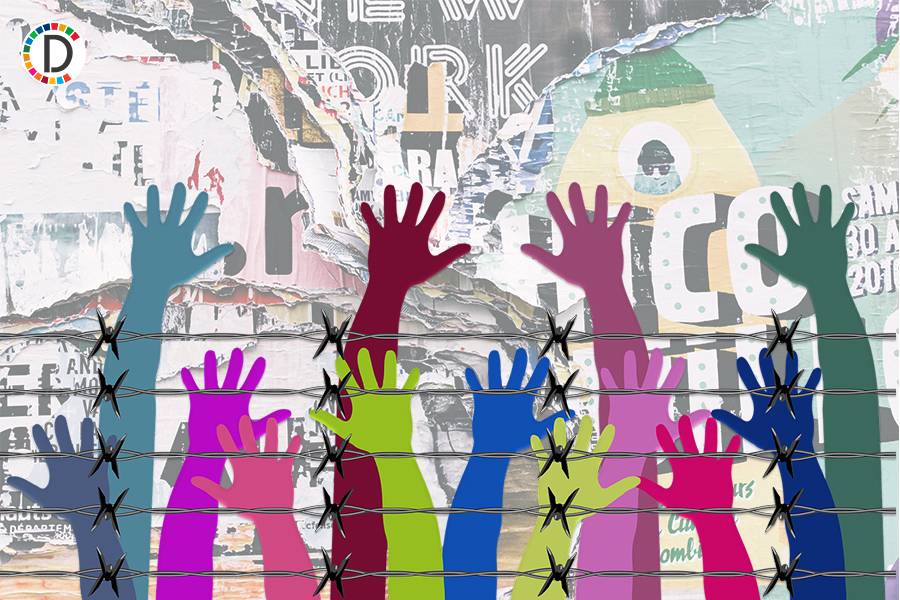Biden, Trudeau start talks after making deal on asylum seekers
The migration deal, according to a final rule set to be published in the U.S. Federal Register, will allow Canada to turn back immigrants at unofficial crossings including Roxham Road, a dirt path between Quebec and New York State that a growing number of migrants use. Border crossings between the two countries are governed by the Safe Third Country Agreement (STCA), which allows U.S. and Canadian officials to turn back asylum seekers in both directions at formal points of entry, but does not apply to unofficial crossings.

U.S. President Joe Biden and Canadian Prime Minister Justin Trudeau kicked off meetings in Ottawa on Friday after making a deal aimed at stopping asylum seekers from traversing the shared U.S.-Canada land border via unofficial crossings. They are expected to discuss migration, the worsening security and humanitarian situation in Haiti, the war in Ukraine, trade and fighting climate change, officials said.
"We have a lot to talk about, and I think we're going to get a lot done today," Biden said at the start of the meeting, emphasizing the shared values between the two countries. "We have no greater friend and ally than the United States," Trudeau said.
The two leaders met after Trudeau introduced Biden to institutional heads, one of whom - Green Party leader Elizabeth May - gave the president a chocolate bar labelled "PEACE" and made by a Syrian refugee family, Trudeau explained. The migration deal, according to a final rule set to be published in the U.S. Federal Register, will allow Canada to turn back immigrants at unofficial crossings including Roxham Road, a dirt path between Quebec and New York State that a growing number of migrants use.
Border crossings between the two countries are governed by the Safe Third Country Agreement (STCA), which allows U.S. and Canadian officials to turn back asylum seekers in both directions at formal points of entry, but does not apply to unofficial crossings. The new deal extends the STCA to the entire border, the longest undefended frontier in the world, for people who claim asylum within 14 days of crossing, according to the notice. It will go into effect at midnight, according to officials from both Canada and the U.S.
The issue had been a growing political headache for Trudeau, whose parliamentary seat is in Quebec. But skeptics point to the difficulty and cost in monitoring such a long border, and how it may harm migrants. "It's unworkable. How is a border this length monitored? People will cross undetected. People will cross in a more dangerous way," said refugee lawyer Maureen Silcoff. "It's a losing proposition to seal the border."
As part of the agreement, Canada will take in an additional 15,000 migrants over the next year on a humanitarian basis from the Western Hemisphere, a U.S. official said on Thursday. "There are more people on the move in the Western Hemisphere (since) World War Two, it's really staggering, and it's historic," White House national security spokesperson John Kirby told MSNBC on Friday.
Canada will pledge C$100 million ($72.77 million) in aid to Haiti's police on Friday, a government source familiar with the matter told Reuters. The two countries also pledged greater cooperation on nuclear energy and technology, according to a statement. Biden will address parliament on Friday after an introduction by Trudeau, and the two leaders will hold a joint news conference afterward.
Two Canadian men that China had detained for more than 1,000 days until 2021 and who were at the centre of a dispute between Washington and Beijing will attend the speech and gala dinner in Ottawa on Friday, a Canadian government source said. Roxham Road made international headlines in 2017 after then-U.S. President Donald Trump started cracking down on migrants, resulting in a rise of asylum seekers into Canada.
In recent months, there has been a sharp increase in asylum seekers entering Canada through unofficial border crossings. ($1 = 1.3742 Canadian dollars)
(This story has not been edited by Devdiscourse staff and is auto-generated from a syndicated feed.)










